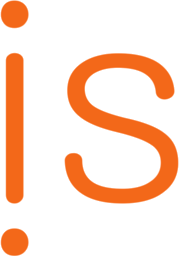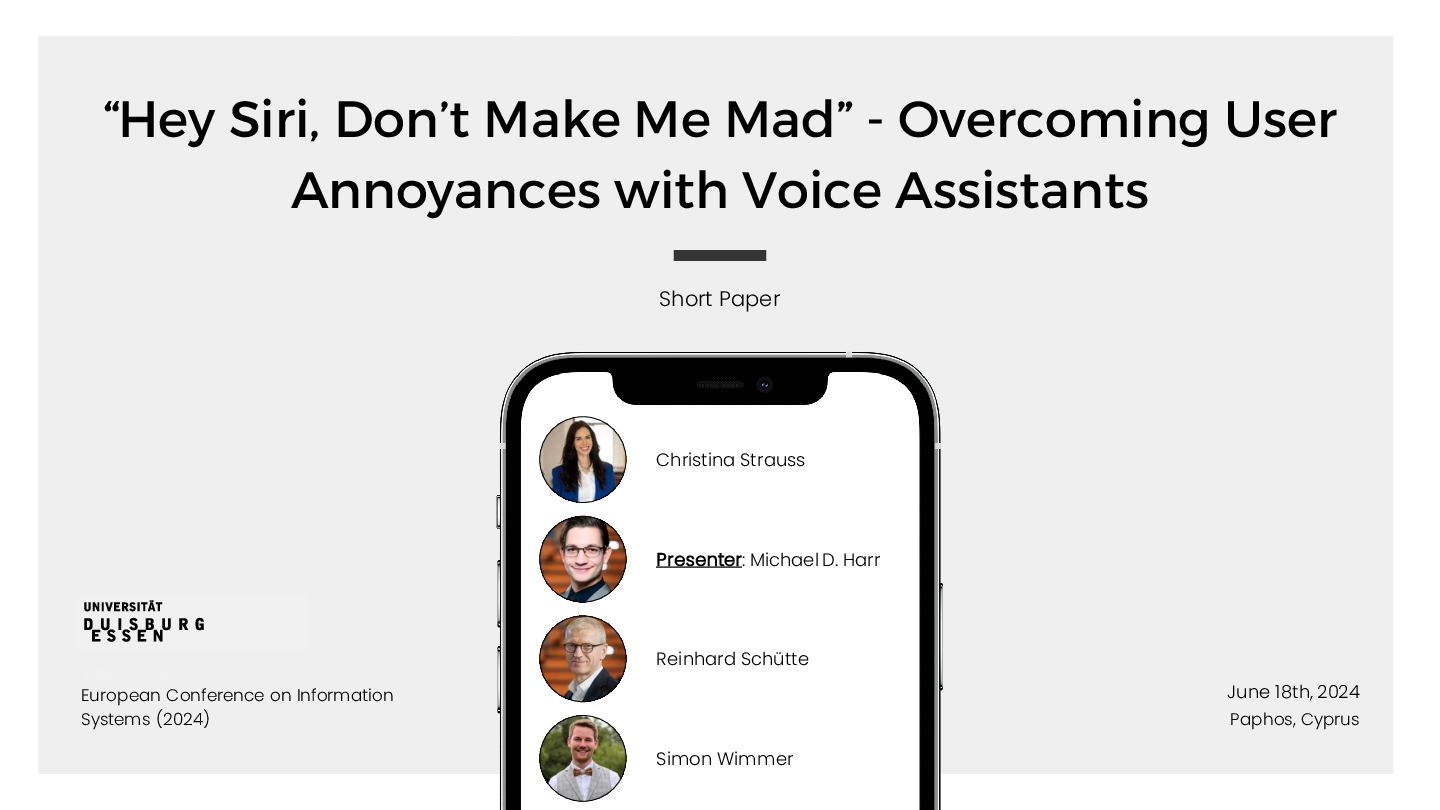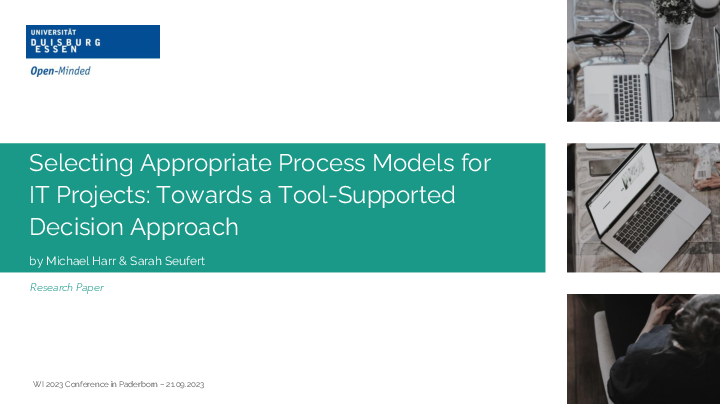Team

Wissenschaftlicher Mitarbeiter
Michael Harr, M.Sc.
- Raum:
- R09 R03 H18
- Telefon:
- +49 201 18-32847
- E-Mail:
- michael.harr (at) icb.uni-due.de
Lebenslauf:
Seit März 2023: Wissenschaftlicher Mitarbeiter/Doktorand am Lehrstuhl für Wirtschaftsinformatik und integrierte Informationssysteme der Universität Duisburg-Essen von Prof. Dr. Reinhard Schütte.
Juli 2021 – September 2021: Freier wissenschaftlicher Autor für die netStart GmbH – Verschriftlichung des deutschen Startup-Monitors 2021 in Zusammenarbeit mit PricewaterhouseCoopers und dem Bundesverband deutscher Startups e. V.
Oktober 2020 – April 2022: Wissenschaftliche Hilfskraft am Lehrstuhl für Digital Business und Digital Entrepreneurship der Universität Duisburg-Essen von Prof. Dr. Tobias Kollmann.
April 2020 – Februar 2023: Studium der Wirtschaftsinformatik (M. Sc.) an der Universität Duisburg-Essen in Essen.
- Studienschwerpunkt: IT-Projektmanagement und Digital Entrepreneurship
- Thema der Abschlussarbeit: Selecting appropriate process models for IT projects: Towards a tool-supported decision approach
August 2017 – September 2020: Studentische Hilfskraft in der Fachbibliothek Geisteswissenschaften/Gesellschaftswissenschaften der Universität Duisburg-Essen.
Oktober 2016 – März 2020: Studium der Wirtschaftsinformatik (B. Sc.) an der Universität Duisburg-Essen in Essen.
- Studienschwerpunkt: IT-Management
- Thema der Abschlussarbeit: Plattform-Governance-Dimensionen – fokussiert auf potenzielle Plattform-Preispolitiken und deren Umsetzung im E-Commerce
Forschungsgebiete:
- Artificial Intelligence Recruiting
- Digitalization and digital Transformation of Human Resource Management
- Enterprise Systems and Human Resource Information Systems
- New Work -> Socio-structural Phenomenons in Contemporary Work Arrangements
- Ethical and Dark Sides of Contemporary Work: Technostress, Technostrain, and Quiet Quitting
- Digital Communication in the Virtual Sphere
Publikationen:
- Harr, Michael Dominic; Obertreis, Hendrik; Schütte, Reinhard: Quo Vadis Human Resource Information Systems: von einem administrativen Prozess- hin zu einem strategischen Kompetenzverständnis. In: HMD Praxis der Wirtschaftsinformatik (2025), S. 1-16. doi:10.1365/s40702-024-01139-3PDFVolltextBIB DownloadKurzfassungDetails
Enterprise Systems haben sich von Material Requirements Planning Systemen über umfassende Enterprise Resource Planning und weiter zu über die Unternehmensgrenzen hinausgehenden Systemen entwickelt. In einer zunehmend von der Digitalisierung geprägten Ära technologie-induzierter Potenziale und vor dem Hintergrund globaler Herausforderungen, wie dem demografischen Wandel und Fachkräftemangel, haben sich Human Resource Information Systems (HRIS) als wichtige Komponenten intelligenter Enterprise Systems herauskristallisiert. Diese „intelligenten“ HRIS zeichnen sich durch die Nutzung fortschrittlicher Technologien, wie künstlicher Intelligenz und Cloud-basierter Infrastrukturen aus, welche die Handhabung zunehmend intangibler Ressourcen wie individueller Kompetenzen ermöglichen. Dennoch zeigen aktuelle Studien eine begrenzte Adoption kompetenzfördernder HRIS-Funktionen und eine überwiegend administrative Nutzung intelligenter HRIS. Der Beitrag adressiert dieses Defizit und zeigt auf, dass die Potenziale intelligenter HRIS und die Mehrwerte einer umfänglichen Integration in das strategische Unternehmensfundament auf Anwenderseite bis dato nicht ausgeschöpft sind. Basierend auf einer Bottom-Up Analyse untersucht der Beitrag, welche Veränderungen bei einzelnen Prozessen erkennbar sind im Hinblick auf ein sich änderndes Verständnis von Ressourcen als Kompetenzen. Für HRIS-Anwenderunternehmen werden vier zentrale Unterstützungsstrategien und für HRIS-Provider perspektivische Entwicklungsrichtungen aufgezeigt, welche die Transition vom administrativen Prozess- zum strategischen Kompetenzverständnis unterstützen. Damit ebnet der Beitrag den Weg für eine zukunftsorientierte Forschung und Weiterentwicklung von HRIS als wichtige Komponente intelligenter Enterprise Systems.
Enterprise systems have evolved from Material Requirements Planning systems to comprehensive Enterprise Resource Planning systems and further to systems extending beyond organizational boundaries. In an era increasingly shaped by digitalization and technology-driven potentials, as well as global challenges such as demographic change and skills shortages, Human Resource Information Systems (HRIS) have emerged as central components of intelligent enterprise systems. These “intelligent” HRIS are characterized by the use of advanced technologies like artificial intelligence and cloud-based infrastructures, enabling the handling of increasingly intangible resources such as individual competencies. However, current studies reveal limited adoption of competence-enhancing HRIS functions and a predominantly administrative use of intelligent HRIS. This paper addresses this deficit, demonstrating that the potentials of intelligent HRIS and the added value of comprehensive integration into the strategic corporate foundation have not yet been exploited. Based on a bottom-up analysis, we examine processual changes regarding a shifting understanding of resources as competencies. For HRIS users, we identify four central supporting strategies. For HRIS providers, we outline prospective development directions, supporting the transition from an administrative process orientation to a strategic competence perspective. Thus, we pave the way for future research and further development of HRIS as vital components of intelligent Enterprise Systems.
- Schütte, Reinhard; Harr, Michael Dominic; Wulfert, Tobias; Syfuß, Dustin: Digitalisierung in der Bau-und Handwerksbranche–Herausforderungen für die Gestaltung digitaler End-to-End-Wertschöpfungssysteme. In: HMD Praxis der Wirtschaftsinformatik (2024), S. 1-21. doi:10.1365/s40702-024-01114-yPDFVolltextBIB DownloadKurzfassungDetails
Die Bau- und Handwerksbranche zeigt seit Jahren eine verhältnismäßig niedrige Produktivitätssteigerung, verbunden mit einem geringen Digitalisierungsgrad. Angesichts von Mitarbeiterknappheit, zunehmender Komplexität von Bauprojekten und steigenden Individualisierungsanforderungen der Endkunden scheint die Digitalisierung einer der Schlüsselfaktoren zur Verbesserung der Produktivität zu sein. Der vorliegende Beitrag analysiert aus zwei strategischen Perspektiven die sich abzeichnenden Entwicklungen in dieser Branche: eine, die bestehende Wertschöpfungslogik und akteurszentrierte Sichtweise, und eine zukunftsweisende Perspektive auf plattformbasierte, service- und informationszentrierte Dienstleistungs-Ökosysteme. Die strategischen Perspektiven werden aus institutioneller Sichtweise eines Großhandelsbetriebs untersucht, welcher als zentraler Intermediär aufgrund zahlreicher Herausforderungen durch Disintermediation gefährdet ist. Die Re-Intermediation digitaler Plattformen und der Wandel hin zu serviceorientierten Geschäftsmodellen könnten disruptiv für die Leistungserstellung sein. Wenngleich eine solche Transition neue Wertschöpfungsansätze verspricht, ergeben sich für innovative Koordinations‑, Kommunikations- und Integrationskonzepte neue Herausforderungen. Basierend auf der strategischen Analyse werden die zentralen Herausforderungen, welche die mangelnde Etablierung der Technologisierung in der Bau- und Handwerksbranche zum Teil bedingen, exemplarisch anhand der Abbildung von Variantenartikeln im Stammdatenmanagement und der Auftragserfassung analysiert. Die zunehmende Variantenvielfalt in der Bau- und Handwerksbranche kann stammdatenseitig über konfigurierbare Materialien abgebildet werden. Diese Materialart bietet für Vertriebsmitarbeiter und Kunden eine Variantenkonfiguration anhand vorab definierter Merkmale. In der Belegerfassung sind zukünftig vielfältige Geschäftsvorfälle und Kundentypen zu integrieren, um das Tagesgeschäft im Vertrieb bestmöglich zu unterstützen. Die skizzierten Herausforderungen müssen durch Standardisierung und intelligente IT-Systeme bzw. Stammdatenkonzepte gelöst werden, um die konstatierten Produktivitätsdefizite überwinden zu können und die Digitalisierung der Bauhandwerker zu stärken.
The construction and crafts sector has seen a relatively low increase in productivity for years, combined with a low level of digitalization. In light of labor shortages, the increasing complexity of construction projects, and rising demands for customization from end customers, digitalization appears to be a key factor in enhancing productivity. We analyze the emerging developments in this sector taking two strategic perspectives: one that preserves existing value creation logic and actor-centric views, and another that looks forward to platform-based, service- and information-centric business ecosystems. The strategic perspectives are explored from the institutional viewpoint of a wholesale business, which, as a central intermediary, faces potential threats from disintermediation. The re-intermediation through digital platforms and the shift towards service-oriented business models could be disruptive, transforming traditional value chains into network-like structures. While this transition promises new value creation approaches, it also poses fresh challenges for innovative coordination, communication, and integration concepts. Based on this strategic analysis, key challenges impeding the full adoption of technology in the construction and trades sector are examined, particularly through the lens of variant article representation in master data management and order processing. The increasing variety of construction materials can be managed through configurable materials in master data, allowing for predefined variant configurations by sales staff and customers. Future document processing must integrate diverse business transactions and customer types to support sales operations effectively. Addressing these challenges through standardization and advanced IT systems is essential for overcoming productivity deficits and enhancing digitalization in the trade sector.
- Strauss, Christina; Harr, Michael Dominic; Pieper, Torsten M.: Analyzing digital communication: a comprehensive literature review. In: Management Review Quarterly (2024). doi:10.1007/s11301-024-00455-8PDFVolltextBIB DownloadKurzfassungDetails
Digital communication has become an essential part of both personal and professional contexts. However, unique characteristics of digital communication—such as lacking non-verbal cues or time asynchrony—clearly distinguish this new form of communication from traditional face-to-face communication. These differences raise questions about the transferability of previous findings on traditional communication to the digital communication context and emphasize the need for specialized research. To support and guide research on the analysis of digital communication, we conducted a systematic literature review encompassing 84 publications on digital communication in leading journals. By doing so, we provide an overview of the current body of research. Thereby, we focus on distinct fields of communication, methods used to collect and analyze digital communication data, as well as common methodological limitations. Building on these insights, we derive a series of comprehensive guidelines from five distinct areas for the collection and analysis of digital communication that can guide future research and organizational practice.
- Harr, Michael Dominic; Wienand, Mareen; Schütte, Reinhard: Towards Enhanced E-Learning Within MOOCs: Exploring the Capabilities of Generative Artificial Intelligence. In: Proceedings of the Pacific-Asia Conference on Information Systems (2024). PDFVolltextBIB DownloadKurzfassungDetails
Massive open online courses (MOOCs) have significantly transformed e-learning by providing global accessibility, collaborative learning opportunities, and high-quality educational content. However, MOOCs face limitations such as limited social interaction, delayed feedback, and linguistic barriers. To overcome these challenges, there is a growing interest in research to leverage artificial intelligence (AI) technologies. In this study, we conduct a systematic literature review examining the capabilities of generative AI (GenAI) and its implications for e-learning in MOOCs. We identify ten capabilities of GenAI, including analytical processing, generative, (personalized) assistant, support, feedback, assessment, communication, reflection, adaptivity, and accessibility. The findings highlight GenAI’s potential to overcome challenges in MOOCs by providing insightful and contextually relevant responses, generating new content, facilitating multilingual interactions, and enhancing the overall e-learning experience. We therefore contribute to the broader understanding of GenAI’s impact on e-learning and suggest avenues for future research on GenAI and its integration in MOOCs.
- Strauss, Christina; Harr, Michael Dominic; Schütte, Reinhard; Wimmer, Simon: "Hey Siri, Don't Make Me Mad" - Overcomming User Annoyances With Voice Assistants. In: Proceedings of the European Conference on Information Systems (2024). PDFVolltextBIB DownloadKurzfassungDetails
This study examines the effects of integrating a technically advanced and more human-like large language model into a voice assistant to assess, how technical advancements mitigate user annoyances. Therefore, a generative pre-trained transformer was integrated into Siri and made available to 23 interview participants. Preliminary results reveal a decrease in user-reported annoyances, showing that the integration not only improves technical accuracy but also enhances the perceived humanness of interactions. However, subsequent interviews indicated that the distinction between the effects of technical advancements and the infusion of humanness emerged as critical, indicating a complex interplay between these factors. It is therefore planned to differentiate between technical and human improvements in the further development of this article. The results contribute to the discourse on optimizing voice assistants by pinpointing the reduction of user annoyances as a pivotal factor in improving user experience, suggesting pathways for future enhancements in voice assistant platforms.
- Harr, Michael; Seufert, Sarah: Selecting appropriate process models for IT projects: Towards a tool-supported decision approach. In: Wirtschaftsinformatik (WI) 2023 Proceedings (2023). PDFVolltextBIB DownloadKurzfassungDetails
The appropriate selection of suitable process models plays an important role for IT project success. To aid in decision-making, IT project management literature offers a plethora of decision models for selecting suitable process models, however, hybrid process models are often neglected and adoption in practice is low or non-existent. To address this challenge, we draw on contingency theory to develop and implement a tool-supported decision model for the selection and evaluation of appropriate process models for IT projects, thereby leveraging artificial intelligence and machine learning in the context of a self-enforcing network. Our model provides an objective tool to assess process model suitability. Results from a conducted online survey with project management experts indicate high validity. Therefore, we contribute to the field of IT project management by expanding AI-based decision models for selecting and evaluating process models through extending the range of covered models and implementing inherent weighting of criteria.
- Kollmann, Tobias; Kleine-Stegemann, Lukas; Then-Bergh, Christina; Harr, Michael Dominic; Hirschfeld, A.; Gilde, J; Wald, V.: Deutscher Startup Monitor 2021 - Nie war mehr möglich, PricewaterhouseCoopers; Bundesverband deutscher Startups e. V. (Hrsg.), Berlin 2022. PDFVolltextBIB DownloadDetails
Vorträge:
This study examines the effects of integrating a technically advanced and more human-like large language model into a voice assistant to assess, how technical advancements mitigate user annoyances. Therefore, a generative pre-trained transformer was integrated into Siri and made available to 23 interview participants. Preliminary results reveal a decrease in user-reported annoyances, showing that the integration not only improves technical accuracy but also enhances the perceived humanness of interactions. However, subsequent interviews indicated that the distinction between the effects of technical advancements and the infusion of humanness emerged as critical, indicating a complex interplay between these factors. It is therefore planned to differentiate between technical and human improvements in the further development of this article. The results contribute to the discourse on optimizing voice assistants by pinpointing the reduction of user annoyances as a pivotal factor in improving user experience, suggesting pathways for future enhancements in voice assistant platforms.
This study examines the effects of integrating a technically advanced and more human-like large language model into a voice assistant to assess, how technical advancements mitigate user annoyances. Therefore, a generative pre-trained transformer was integrated into Siri and made available to 23 interview participants. Preliminary results reveal a decrease in user-reported annoyances, showing that the integration not only improves technical accuracy but also enhances the perceived humanness of interactions. However, subsequent interviews indicated that the distinction between the effects of technical advancements and the infusion of humanness emerged as critical, indicating a complex interplay between these factors. It is therefore planned to differentiate between technical and human improvements in the further development of this article. The results contribute to the discourse on optimizing voice assistants by pinpointing the reduction of user annoyances as a pivotal factor in improving user experience, suggesting pathways for future enhancements in voice assistant platforms.
Lehrveranstaltungen:
Retail Enterprise Systems, Wirkung und Wirtschaftlichkeit von IT-Systemen
Begleitete Abschlussarbeiten:
- Exploration der Fähigkeiten von ChatGPT für bessere Lernerfahrungen in MOOCs: Eine systematische Übersicht (Bachelorarbeit Wirtschaftsinformatik, in Bearbeitung)
- Artificial Intelligence as a Catalyst for Knowledge Management: Exploring the Integration and Application in Software Development Projects (Masterarbeit Wirtschaftsinformatik, in Bearbeitung)
- Repressed Rage Against the Machine: Investigating Techno Stress as an Antecedent to Quiet Quitting (Masterarbeit Wirtschaftsinformatik, in Bearbeitung)
- Quiet Quitting: Eine literaturbasierte Konzeptualisierung und Differenzierung von verwandten Begriffen (Bachelorarbeit Wirtschaftsinformatik, in Bearbeitung)
- Eine funktionale Taxonomie KI-basierter Recruitment Tools: Erkenntnisse aus Wissenschaft und Praxis (Masterarbeit Wirtschaftsinformatik, 2024)
- Einsatz von Verfahren der künstlichen Intelligenz bei Recruiting potenzieller Bewerber: Evaluation der Einsatzpotenziale (Bachelorarbeit Wirtschaftsinformatik, 2023)
- State-of-the-Art-Analyse des Recruiting von Talenten auf sozialen Netzwerken (Bachelorarbeit Wirtschaftsinformatik, 2023)



